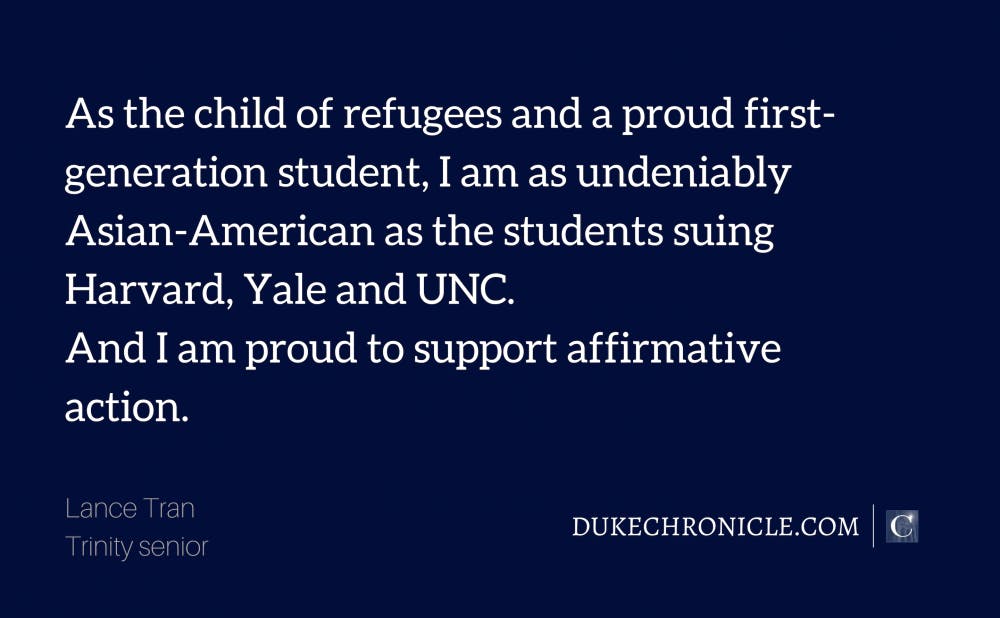The vast majority of Asian-Americans historically have and continue to support affirmative action, a policy extending crucial access to higher education for marginalized groups who have been historically barred from attending colleges and universities.
But recently, a lawsuit channeling the anxieties of Asian-Americans who face daunting acceptance rates at selective schools has made headlines. The group suing Harvard, Students for Fair Admissions (SFFA), consists of more than a dozen Asian-Americans who have been denied admission to the university. SFFA challenges the use of race conscious admissions, alleging that Harvard discriminates against Asian-American applicants by giving preference to other minority racial groups. Similar cases are happening at Yale, UNC and other schools.
With the Trump administration’s Department of Justice recently siding with SFFA, the lawsuit was cleared just this past week to go to trial. If the case reaches the Supreme Court with Brett Kavanaugh as the new swing vote on affirmative action, the consequences are going to be far reaching and devastating—Duke has recently signed onto a brief along with other peer institutions to defend Harvard’s use of race conscious admissions.
But don’t be fooled. This lawsuit has nothing to do challenging discrimination against Asian-Americans, and everything to do with pushing a racist agenda.
Take a second and consider the optics of the case, starting with the plaintiff:
SFFA is an organization created by Edward Blum, a conservative activist who opposes any law or policy that has anything to do with race, and whose legacy is attacking civil rights protections.
Blum was the chief architect of Fisher v. University of Texas, which challenged race conscious admissions, alleging that increasing diversity denied a white woman’s admission. When his case failed and the Supreme Court ruled in favor of Texas, Blum decided to spend the next few years cherry picking the perfect group to act as a racial wedge: a group of Asian-Americans who felt wronged by admissions.
This case’s aim is to dismantle affirmative action, and the strategic use of Asian-Americans rings all too familiar.
This is only the latest embrace of the model minority myth, weaponizing our oppression and pitting Asian-Americans against other people of color.
The model minority myth isn’t just about Asians being portrayed as quiet and nerdy in Hollywood. Its intentional construction by white conservatives served a specific purpose: using the relative ‘success’ of highly educated and wealthy Asian-Americans to attribute Black failure as a matter of personal choice. It argues that Blacks should just ‘work harder’ like Asians, systematically denying the existence of any racial inequality and discrimination. And thus, the racially-gaslighting mindset was born: ‘If they made it, why can’t you?’
It’s no coincidence that this lawsuit aiming to dismantle affirmative action is painting the same portrait. At the center of SFFA’s arguments is the notion that model, hard working Asian-Americans are losing seats to undeserving Blacks and Latinos.
Yet the fundamental notion that Blacks and Latinos are taking Asian-American seats through affirmative action is patently false and racist. A study shows that removing affirmative action will give Asian-Americans no significant advantage, and will instead drastically harm Black, Latino, and Native American students.
Few groups have benefited more from affirmative action than Asian-Americans. In the 1970s, we were considered an ‘underrepresented minority’ to be targeted in higher education. Affirmative action first opened the doors for us, and we are now four times better represented at elite universities than our national population, the largest growth of any ethnic group.
And even today, studies demonstrate that less privileged Asian-Americans such as “Southeast Asians, Native Hawaiians, Pacific Islanders, and low-income Asian-Americans” continue to benefit from affirmative action. The model minority myth only serves to mask these realities.
Economic, political and social discrimination against Asian-Americans is very real. And it’s very possible that anti-Asian-American bias exists within college admissions. But strategically using our discrimination to attack other people of color by dismantling affirmative action? This ain’t it.
We can never forget the Black activism that led to the Civil Rights Act of 1965, guaranteeing our right to vote, find employment, attend desegregated schools and enroll at historically white colleges like Duke. The same progressive movements that led to the Immigration and Naturalization Act of 1965 that removed racial quotas, allowing many of our families to immigrate to this country in the first place.
Asian-Americans do not exist in a vacuum free from the economic, political and racial realities of this country. And that reality is precisely what affirmative action seeks to address: a country has historically denied Blacks, Latinos, Native Americans, Asians, women and poor people access to higher education.
We only stand to benefit when we stand together, and access to higher education is no different.
Asian-Americans concerned about discrimination in college admissions should instead take aim at a policy that demonstrably benefits the privileged at the expense of almost all non-white applicants: legacy admissions.
The admissions systems at schools like Duke and Harvard are far from perfect. Duke has a serious lack of socioeconomic diversity and continues to embrace legacy admissions, conferring a serious advantage that can hardly be justified as fair. But affirmative action is not the problem here.
So, Asian-Americans: it’s not just about being on the right or wrong side here. It’s about reclaiming our narrative. It’s about refusing to be a wedge in attacks on other people of color. Siding with passivity is siding with complicity and injustice. With the Supreme Court’s conservative bloc in now set in place, it’s now more important than ever that we speak up and let them know what we stand for.
As the child of refugees and a proud first-generation student, I am as undeniably Asian-American as the students suing Harvard, Yale and UNC. And I am proud to support affirmative action.
Lance Tran is a Trinity senior. His column runs on alternate Tuesdays.
Get The Chronicle straight to your inbox
Signup for our weekly newsletter. Cancel at any time.

